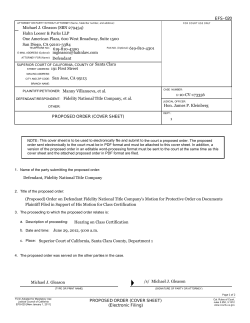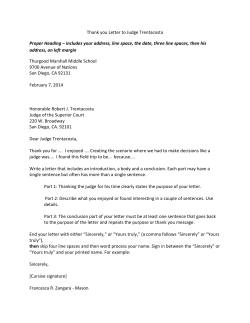
please click here. - Cuyahoga County Common Pleas Court
30.0 ASSIGNMENT OF CRIMINAL CASES Local Rule 30 (as amended) The Judge presiding in the Arraignment Room shall be chosen by lot and shall serve for a period of two weeks. All motions for continuance will be made in writing and may only be granted by the Arraignment Room Judge upon a showing of good cause. A second continuance may only be granted by the Administrative Judge. All cases shall be assigned to a Judge by lot, upon arraignment of the defendant, in accord with Rules 4 and 36 of the Rules of Superintendence of the Courts of Ohio. There will be a random assignment of cases to Judges through an objective and impartial system that ensures the equitable distribution of cases among Judges. The following procedure will be used: (A) NOTWITHSTANDING PARAGRAPH (E) BELOW, a red ticket shall be drawn in all capital cases; PROVIDED HOWEVER, when a case is initially indicted without capital murder specifications but is later re‐indicted based on essentially the same set of facts and circumstances which adds a capital murder specification. The originally assigned Judge will remain on the case until final disposition and said Judge shall be correspondingly credited with receiving a capital case assignment. (B) Cases will be randomly assigned to the docket of a Judge where the defendant has no pending case[s], is not on probation or community control at the time of the offense, there is no co‐defendant[s] with a pending case or probation or community control cases, or the defendant pleads guilty at arraignment, except where a defendant has a confirmed serious mental illness or is developmentally disabled as defined in local rule 30.1 (a)(1) or (a)(2). (C) Where a defendant has a confirmed serious mental illness or is developmentally disabled as defined in local rule 30.1 (a)(1) or (a)(2), cases will be randomly assigned to Judge's dockets pursuant to local rule 30.1 (c). where a defendant's mental status is unconfirmed at arraignment, the case shall be assigned pursuant to section (b) of this rule. If after arraignment it is determined that the case should have been assigned to a Mental Health Court Docket, the case may be reassigned pursuant to Local Rule 30.1 (c)(2). (D) In capital cases where the defendant has in open Court already made a knowing, intelligent, and voluntary waiver of the right to a jury trial and has made the decision to have a trial before a three Judge panel or a plea required to be heard by a three Judge panel. The Administrative Judge shall assign the remaining panel members by random selection. If the Administrative Judge determines an assigned Judge is unavailable, the Administrative Judge will randomly select another Judge to replace that Judge. (E) Cases will be re‐assigned to Judges when: (1) A single defendant commits a new offense while on probation or community control. The case shall then be assigned to the docket of the Judge with such prior case. (2) A single defendant has a pending case. The case shall then be assigned to the docket of the Judge with the pending case. (3) A defendant has co‐defendant[s] on this case or has co‐defendant[s] with a prior pending case, then the case shall be assigned to the docket of the Judge who was assigned the pending case. If two or more defendants have pending cases, the case shall be assigned to the docket of the Judge with the lowest numbered case. (4) A defendant has co‐defendants where one co‐defendant has a pending case and the other defendant has a probation or community control case. The case shall then be assigned to the docket of the Judge with the pending case. (5) A defendant has co‐defendant[s] where no co‐defendant has a pending case but a co‐defendant[s] is on probation or community control, then all defendants shall be assigned to the docket of the Judge who has a co‐defendant on probation or community control. Where there is more than one co‐ defendant on probation or community control, the case shall be assigned to the docket of the Judge with the lowest numbered case. Passed by Emergency Vote on 5/20/2015
© Copyright 2025










